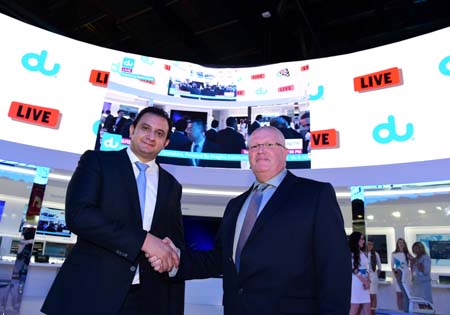Now that the MENA broadcast rights for the Premier League have been awarded exclusively to Al Jazeera Sport, Karim Sarkis, who was part of the team that negotiated the rights for Abu Dhabi Media for the previous three seasons, sheds light on some of the challenges that lie ahead for the region The saga of […]
 Now that the MENA broadcast rights for the Premier League have been awarded exclusively to Al Jazeera Sport, Karim Sarkis, who was part of the team that negotiated the rights for Abu Dhabi Media for the previous three seasons, sheds light on some of the challenges that lie ahead for the region
Now that the MENA broadcast rights for the Premier League have been awarded exclusively to Al Jazeera Sport, Karim Sarkis, who was part of the team that negotiated the rights for Abu Dhabi Media for the previous three seasons, sheds light on some of the challenges that lie ahead for the region
The saga of the renewal of the Premier League television rights recently culminated with their award to Al Jazeera on an exclusive basis. As usual, the price paid has not been announced. Given the nature of the auction process and judging by its extended duration, it would probably be safe to assume the rights cost hundreds of millions of dollars.
If there is one thing that everyone agrees on, it is that the process took far too long. The result was announced roughly a month before the scheduled start of the 2013 season, leaving fans and subscribers confused as to how and where they will be able to watch the games. That the PL allowed the process to drag on for so long must imply that they reaped a financial benefit above and beyond what they would have gained by accepting the initial bids. Nevertheless, the proceedings did not help the reputation of the sports rights sales processes in MENA, which are in general quite ambiguous in nature.
Unless Al Jazeera has been quietly preparing for winning the PL rights, the short duration until the seasons kick-off leaves them with a considerable challenge. Undoubtedly, Al Jazeera will provide a high standard of coverage with a star line-up of pundits, presenters and commentators. If, as has been speculated, the PL has mandated that cards be paired with decoders, Al Jazeera has a limited amount of time to make sufficient decoders available in the market. Ironically, ADMs decoders are compatible with Al Jazeeras cards, but pairing will require the co-operation of ADM, which may be difficult to secure. There is a marketing challenge in defining and communicating pricing, availability and technical requirements to potential subscribers. Finally, there is a customer service challenge in signing up a significant number of new subscribers within a short period of time. The coming weeks will confirm whether Al Jazeera is able to meet these various challenges.
The exclusivity of the PL rights firmly answered the question of co-operation among MENA rights holders. Many speculated that ADM and Al Jazeera had drawn a line in the sand in the face of ever-escalating rights costs. Indeed, had this scenario played out, it would have set the tone for a reduction in future sports rights values in the region. As it stands, future rights costs may rise sharply if ADM attempts to replace the PL rights with Spanish, Italian or UEFA rights as they come up for renewal in the coming years.
As many have commented, the costs of sports rights in the region are not commercially viable. Although I do agree, neither Al Jazeera nor ADM are naïve enough to think that they are purchasing assets to generate a financial return over a three-year period. Each has their own strategy and perspective and, in both cases, my guess is their reasoning extends beyond the commercial constraints of regional pay-TV.
Some have been critical of the rights owners for embarking on strategies that promote price hikes. I would agree that constant shifting between platforms is not conducive to long-term subscriber growth, but in the end, sports rights are worth whatever someone is willing to pay for them. Incidentally, rapidly escalating costs for sports rights are not unique to the MENA region. The primary difference is that in most other markets, the bidders are driven by a commercial objective and operate within a market with sufficient scale to justify the costs.
For ADM, it must now, of course, determine the fate of its platform, which has hundreds of thousands of subscribers and represents a significant multi-million dollar investment. Most subscriptions will likely be expiring between August and December, and ADM needs to offer its existing subscribers a viable alternative. It can, of course, shut down the platform and cut its losses, thus leaving Al Jazeera as the only viable buyer of international football rights in the region. Alternatively, ADM may elect to expand its HD entertainment offering to retain subscribers and gain new ones. Another possible scenario is for ADM to wait until major football and sports rights come up for renewal and attempt to acquire them. Each of these scenarios will have a significant impact on the pay-TV market in the region.
What next for Al Jazeera? After securing the rights for every major football tournament, will Al Jazeera focus on local football league rights? Or will they cast a wider net and seek to expand into entertainment? It would be an opportunity to create a compelling and complete pay-TV portfolio to entice a larger number of consumers at a lower subscription price point that Al Jazeera is clearly comfortable with. In comparison to the costs of sports rights, movie and entertainment channel rights in the region are a “bargain”!
Karim Sarkis is the CEO of Sync Media, a content creation company in Dubai. Previously, he was part of the team that acquired the EPL rights and launched Abu Dhabi Medias pay TV platform.














































































